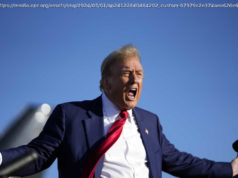As Hurricane Harvey swirls through the Gulf of Mexico, speeding toward the Texas coast, it could also bring a critical test of President Donald Trump’s abilities as commander-in-chief.
The Department of Homeland Security, which oversees the Federal Emergency Management Agency (FEMA) and the US Coast Guard, also is without a permanent leader after Trump’s decision to pluck retired Gen. John Kelly from his post atop DHS to become his White House chief of staff. Kelly’s deputy, Elaine Duke, has since taken the helm as acting secretary.
The White House on Thursday expressed confidence in Duke’s abilities to manage the response and noted that Kelly will also be at Trump’s side as Harvey makes landfall.
„There’s certabinly someone at the helm, “ White House press secretary Sarah Huckabee Sanders said, pointing to Duke. „And again, I think that we are in great shape having General Kelly sitting next to the President throughout this process, and probably no better chief of staff for the president during the hurricane season.“
„The President has been briefed and will continue to be updated as the storm progresses, and certainly something he’s very aware of and will keep a very watchful eye on, and stands ready to provide resources if needed, “ Sanders said.
DHS press secretary David Lapan pointed out Friday on Twitter that Duke is a „DHS veteran w/ extensive experience in previous assignments, “ and said FEMA administrator Brock Long is „leading experienced career staff“ at FEMA.
Duke is not the only interim official leading a critical component of the federal government’s natural disaster response and monitoring efforts.
Trump’s pick for FEMA administrator was confirmed in June, but officials at NOAA are still waiting for Trump to nominate someone to lead the key weather monitoring agency. The post remains vacant — and without a Trump nominee — alongside dozens of other deputy, under and assistant secretary positions in the Trump administration that require Senate confirmation.
And while Trump nominated two deputy directors for FEMA, they have yet to be confirmed into their positions.
Unrelated to those nomination woes, the National Hurricane Center is still fielding applications for a permanent director after its chief resigned in May.
„The people acting in an acting capacity are 110% capable, “ said Dennis Feltgen, the National Hurricane Center’s public affairs officer.
But Retired Lt. Gen. Russel Honoré, who helped organize relief efforts to Hurricane Katrina in 2005 as commander of Joint Task Force Katrina, said he was concerned about NOAA having a temporary leader as the hurricane season ramps up.
„It is a concern, “ Honoré said. „We don’t allow temporary coaches in the SEC, so why the hell are we running a federal agency with a temporary leader? It doesn’t create a team.“
Honoré expressed confidence in the career staffers who have taken over key posts in the interim, but said the Trump administration should not have entered hurricane season without a permanent director at the helm of NOAA.
„A temporary person doesn’t have the gravitas, “ Honoré said.
A NOAA spokesman said Friday that the agency is „fully prepared for the hurricane season“ and is launching new and improved services, such as issuing storm surge watches and warnings along the Atlantic and Gulf coasts.
„Under our acting administrator, NOAA continues to provide the American public with science and services important for public safety, the nation’s natural resources, and the economy, “ NOAA’s deputy communications director, Scott Smullen, said in a statement. „The National Hurricane Center has an experienced leader in Dr. Ed Rappaport, who has been acting director before in his 30 years at the center.“
Trump and his White House are closely monitoring the storm.
Trump tweeted Friday morning that he is „closely monitoring #HurricaneHarvey developments & here to assist as needed.“
He tweeted in the afternoon that he had been briefed by Long, his new FEMA administrator, as well as Duke and his homeland security adviser, Tom Bossert. Bossert previously worked in FEMA’s office of legislative affairs and oversaw emergency preparedness at the White House under President George W. Bush.
Bossert has been in close touch with the heads of the DHS, FEMA and other key federal agencies, a White House official said.
Bossert said Friday that Trump had three primary concerns during his Friday morning briefing. The President wanted to be sure that people were evacuating and „getting out of harm’s way, “ that emergency management officials had the „appropriate resources, “ and that people in Louisiana, as well as Texas, be prepared in case the storm’s path changes, Bossert said.
Trump was reassured that resources to handle the storm were pre-deployed, Bossert said.
Trump also headed to FEMA earlier this month to get briefed on the government’s preparations for this year’s hurricane season. Trump posted a video of his visit to FEMA on Twitter Thursday, as he called on the public to „#PlanAhead.“
Long has been widely praised as a professional and highly capable pick to lead the disaster relief agency through a hurricane season that forecasters have warned will be more aggressive than usual.
Now, as Harvey approaches the US, Long told Bloomberg News on Monday that he is bracing for the impact.
„We’ve gone 11 years without a major hurricane land-falling in the US — that’s a one-in-2,000 chance, “ Long said in the interview . „We’re gonna get hit by a major hurricane. I worry that a lot of people have forgotten what that’s like.“
The last Category 3 storm to hit the US was Hurricane Wilma in October 2005, according to the National Hurricane Center. But it was another hurricane months earlier that has remained seared in the minds of government officials involved in natural disaster preparedness.
Hurricane Katrina, which hit the New Orleans area in August 2005, became a defining moment of Bush’s administration, whose response to the hurricane was marked by a series of errors in preparation and mismanagement that sent the president’s approval rating to record lows.
The disastrous hurricane response, which led to the FEMA administrator’s resignation as more than 1,800 lost their lives and thousands more were left stranded in New Orleans, has become a cautionary tale for government officials preparing for natural disasters — and for presidents, who are reminded of the stain such failures can leave on their legacy.






